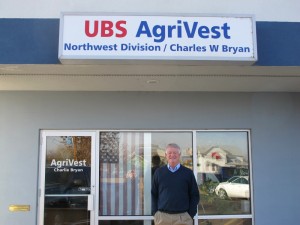Reporter’s Notebook: How to Get Information in a Non-Disclosure State

Molly Messick / StateImpact Idaho
In Idaho's tight-knit community of real estate brokers and buyers, no one would share Charlie Bryan's name with a reporter. Drive past his office, though, and there it is, on the sign.
While reporting our recent story about Idaho farmland prices and investor interest in cropland, I ran across a quirk of Idaho law that posed a bit of a challenge: sales prices aren’t public information. Idaho is one of ten states that are known, in the real estate business, as “non-disclosure states.” For a better understanding of what that means, I called up the Idaho State Tax Commission’s Property Tax Policy Supervisor, Alan Dornfest.
Dornfest says “non-disclosure” is a bit of a misnomer. It’s not that Idaho prohibits disclosure. It’s that the state doesn’t mandate it. “There is no disclosure law,” he said. “We simply don’t have a requirement, like most states do, for one of the transactors in that land sale, or building sale, or whatever it was to tell a government entity the sale price.”
In other words, if you walk into a county assessor’s office hoping to get a sense of recent farmland sales prices, you might find something useful (people can choose to give the information, after all.) But, given that farmers are known for their taciturnity, you probably won’t find much of anything. Klaren Koompin, one of two brothers behind a large-scale Power County operation called Koompin Farms, said the recent sales records he’s seen disclose very little. “Usually the amount is listed as ‘for sums rendered,'” he said. And the highest-price sale he knows of? You won’t see it on file. “Four-hundred and eighty acres that sold for $10,000 an acre, you could not find that at the courthouse,” he said. “But it happened.”
For a reporter, the effect of Idaho’s non-disclosure status is that this is how things work: start with hearsay, and triangulate. For real estate brokers and assessors working in absence of a disclosure requirement, personal relationships become critically important. Those relationships are key in getting the most up-to-the-minute information about what sales are happening, for how much, and where. As one broker put it, “the coffee shop is quite a network.”
There are standard questions every reporter asks in the course of an interview: “Who would know more about this?” and “Who else should I call?” In reporting this story, those questions were often met with hesitation and polite demurs. Trying to find out what institutional investors are most active in Idaho was the biggest challenge. A farmer or a broker might share an investment company’s name, but more often than not, the name of the on-the-ground representative was privileged information. No one wants to compromise those all-important relationships.
When I finally reached AgriVest’s Charlie Bryan, I found him the newfangled way. I went to the internet, and eventually saw his name next to a number with a 208 area code. I called, and he answered. When I arrived at his office for our interview, I laughed. In a week of phone calls, no one would share Bryan’s name. But there it was, printed in proud block letters on the sign out front.


